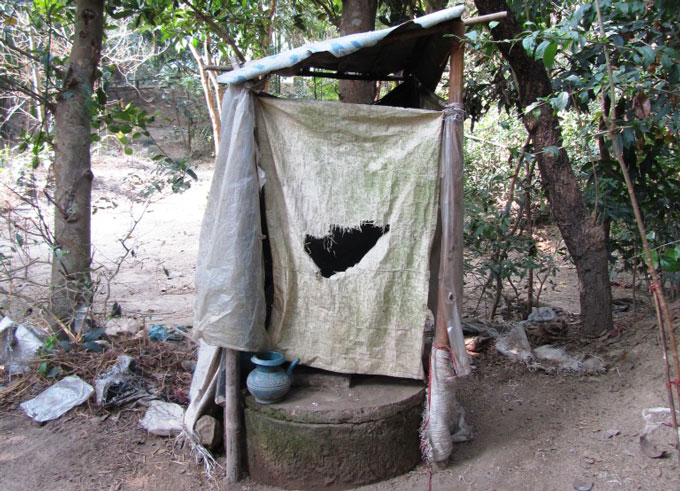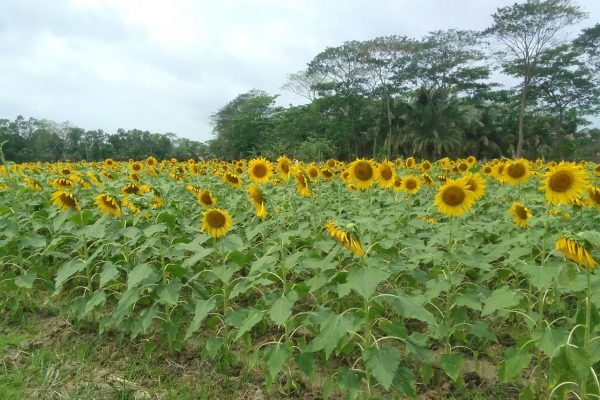Reading Time: 3 minutes
I would like to share the peculiar sanitation situation in Boroitoli, a hilly village in an extremely hard-to-reach area of Fatikchari sub-district of Chittagong, Bangladesh. We visited this village earlier this year to observe the existing conditions of water, sanitation and hygiene.
I would like to share the peculiar sanitation situation in Boroitoli, a hilly village in an extremely hard-to-reach area of Fatikchari sub-district of Chittagong, Bangladesh. We visited this village earlier this year to observe the existing conditions of water, sanitation and hygiene.
Boroitoli is a very isolated village where no other organisations are working. You have to walk seven kilometres to reach the local market, Shantir Haat. There are no bicycles, rickshaws or carrier vans because the hilly terrain makes it difficult, and even travelling by 4-wheel drive vehicles, locally referred to as chander gari, is not easy. The area is so remote that when a teacher left the job from a local primary school, people from other areas were not even interested in applying for the position. With no eligible candidates in that locality, the head teacher of this school, with permission from the local education authority, hired his wife.
In Boroitoli, households are scattered – it requires at least 15 minutes to go from one house to another. From what I observed, most people have little or no education, and are living in primitive conditions. Many of them don’t even leave the village to go to nearest city, Chittagong.
So far, the sanitation coverage in this village is only six per cent. People of this village are not aware of issues regarding sanitation, hygiene or safe water. Women, especially, do not have access to such information. They don’t have sufficient knowledge about hygienic latrines, they do not know the usefulness of a water seal, and many have not even seen one. In fact, one woman told us that she doesn’t even know what a water seal is. Where a household did have a latrine, we found that most were substantially below the mark in terms of hygiene.
But what’s really surprising is that people in this village spend about BDT 50 per month to recharge the balance on their mobile phones, and yet they are not interested in spending money to make latrines. In this area, building a twin-pit latrine to BRAC’s recommended standard will cost approximately BDT 5,000. This may seem like a lot compared to their monthly mobile phone expenditure, however, a latrine is a one-time investment and it actually helps save quite a bit of money. This is because a proper hygienic latrine will prevent the spread of communicable diseases and therefore reduce medical expenses. Moreover, the size of each pit allows it to last a family of four to five members for two years, and the two pits are used in rotation: when one fills up, the other one can be used, while content of the filled up pit is digested into organic fertiliser for the next 18 months. For those who cannot afford to pay the full price of a latrine, options for loans and grants are made available to them.
This dire situation is actually a result of an information gap, as well as the lack of a rural sanitation centre, from where people usually purchase materials for building latrines. Moreover, the transportation cost is higher than the purchasing cost of such materials, and in addition to this, there is a fear of materials being damaged on the bumpy roads. Furthermore, people are suffering from water scarcity. “We need to collect water from a spring two kilometres away. It is difficult but we have to do it every day,” said one resident of Boroitoli village. This spring water is not safe, but they still consume it because that is all that they have access to. On top of all these obstacles is people’s personal habit, since for as long as they can remember they have been defecating in bushes, which are quite abundant in this hilly area.
The BRAC Water, Sanitation and Hygiene (WASH) programme has begun working in this area to help increase access to sanitation and safe water, as well as to achieve a sustained change in behaviours. Action research on sanitation supply chain has been undertaken to figure out the current problems, and how to work towards improving the current water and sanitation situation of this village. This may be a difficult area to work in due to the hilly terrain and the social conditions, but for BRAC WASH it is worth overcoming such hurdles since it results in changing people’s lives for the better.
A.T.M. Ridwanul Haque is a senior sector specialist for the BRAC Water, Sanitation and Hygiene Programme.






